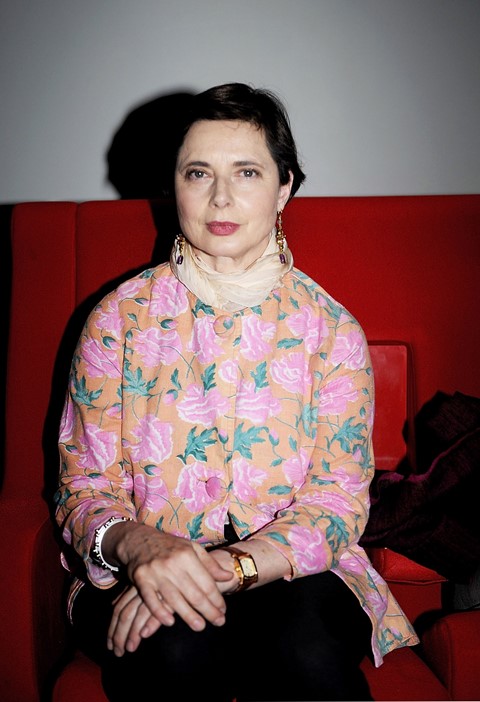As her new film La Chimera hits cinemas, the actress and model opens up on her turbulent rise to fame, and enjoying a full-circle moment with director Alice Rohrwacher's magical slant on her father's neorealism
It’s no mere figure of speech to call Isabella Rossellini a child of cinema. After all, the 71-year-old actress and model owes her existence to two films made by her father – Rome, Open City and Paisan – which so moved her mum, screen icon Ingrid Bergman, she wrote to him asking for a role in one of his films. Months later she was pregnant, embroiled in a scandalous love affair that saw her hounded from public life in the US. (Both were married at the time.) Bergman relocated to Rome, where she had three children with the filmmaker, including Isabella and her twin sister Isotta, born in 1952.
All this has long since passed into legend, but Rossellini is still inscribing her own six decades into a career that’s seen her grace the cover of Vogue nearly 40 times, play muse to a who’s-who of American fashion, and perform in films from Guy Maddin, Denis Villeneuve, Robert Zemeckis and of course David Lynch, whose decision to cast her in his low-budget indie Blue Velvet led to a five-year love affair of their own. Her performance as tortured nightclub singer Dorothy Vallens was shocking and indelible, sparking a backlash freighted with echoes of her mother’s treatment in the press.
In later years, she’s sent up her sophisticated screen persona with forays into documentary-making (her wickedly funny, and fact-filled, Green Porno and its offspring), earned a master’s in animal behaviour and conservation, and taken up farming on the 28-acre Long Island plot she now calls home. Taking a break from tending to her flock, Rossellini recently returned her homeland for La Chimera, Alice Rohrwacher’s magical ode to her ancestors told through the eyes of an archaeologist turned tombarolo (tomb raider), played by Josh O’Connor. It’s a film about living reverently, with irreverence – and Rossellini, as a grieving matriarch holding court in her crumbling palazzo, fits the bill perfectly.
Alex Denney: Hi Isabella, where in the world are you?
Isabella Rossellini: I’m on the farm where I live, about 100km from New York.
AD: I’d like to start by talking about La Chimera, because it’s a special film. Was it nice being back in Italy for the shoot?
IR: I haven’t worked in Italy a lot and by living here [in the US] so long I’d kind of lost that connection to the country. So when Alice asked me to be in the film I was delighted. [loud buzzing sounds] Can you hear me OK? Because there’s a chainsaw cutting down a tree that came down in my neighbour’s garden. They could only reach it through my garden, but they keep leaving the gate open for the dogs to run through… Yoshi? Yooo-shi!
AD: Are they all there?
IR: Yes, they’re here! I actually met Alice through her sister, Alba [who also stars in the film]. Their father is German and they speak many languages ... They are farmers but they also have kind of an internationalist [sensibility], and I can see that in her films. So I think she was less intimidated than other directors to work with me.
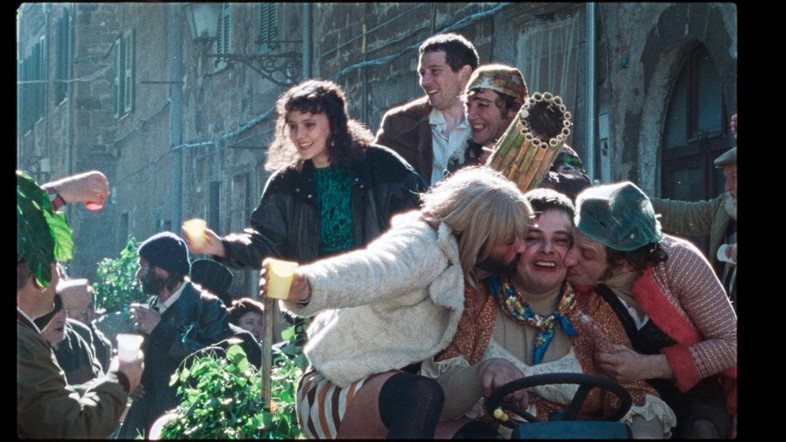
AD: Alice’s films have this magical connection to the countryside. As someone who grew up between Rome and your parents’ villa in Santa Marinella, did you feel like a city girl or a country girl at heart?
IR: I think both. Now I’ve been in the countryside for the last 12 years, I’m very much of a country girl. So that for sure is a connection with Alice. Her father is a beekeeper and we often talk about bees or sheep. [Rossellini produces honey on her farm.] But Alice is heartbroken, because there’s a culture of farming that’s been looked down on [in Italy] and it’s disappearing. I mean, that was very, very evident in [her last film] Happy as Lazzaro. And here there is still this feeling. But this film is mostly about the beyond.
AD: The beyond?
IR: Yes, I remember reading the script and I said, “Is the core of the script dealing with death?” And she said, “Not death – the beyond. There is a difference.” The beyond is our Etruscan and Roman cultures, which are still present in our lives [through] churches, monuments, houses, paintings – they left behind a lot of traces. And so they’re not really dead. The film is about these tombaroli and what happens to them with the violation of these tombs. There’s a poetic level to the film.
AD: Alice’s style draws consciously on a lineage of Italian cinema. Is there a director she reminds you of most?
IR: You know, somebody called this film ‘magical neorealism’, which I thought was nice. Neorealism of course [refers to] the films my father [Roberto] made after the war; they were called ‘neorealist’ because they looked like documentaries but they were fiction films. Alice has some of the elements and techniques of neorealism – working with real people, mixing actors and non-actors and all that. And then she has her magical, Alice’s point of view. It’s moving for me to see there is a history of Italian cinema and my father was so important in that history. And it has affected Alice, but Alice takes it a step further.
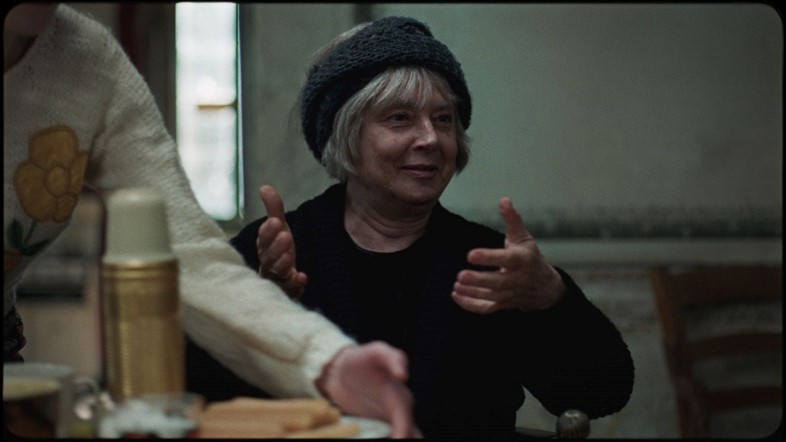
AD: You’ve lived in the US since you were 18, do you feel like an American these days?
IR: The problem with people like me, and I share this with a lot of my friends, is there’s [this feeling of] well, you’re neither American or European. There was a very lovely film about this last year, Past Lives. But I will miss coming to Italy to see my friends [when I’m no longer able to go].
AD: What’s a film that changed your life?
IR: Blue Velvet changed my life in that it made me an actress, for better or for worse; it was only my third film. So that was definitely a landmark for me.
AD: You were dropped by your agency after the film was released, is that right? That must have been traumatic.
IR: Well, I thought David was a great artist and we ultimately fell in love and all that, but we were amazed by the negative reaction it got. Generally people who loved the film praised David, because it’s a very auteur film, right? And the people who didn’t like it said it was Isabella Rossellini belittling the legacy of her mother by doing porno. So that was very hurtful.
AD: Are you able to look back fondly now?
IR: I was with Kyle MacLachlan a few years ago; we were at MoMA to celebrate the film’s anniversary. We were laughing and I said, “You know, 30 years ago we were afraid to go out in the streets!” Because some people were really mad at us. There was an Italian critic called Gian Luigi Rondi; he was a very good friend of my father and mother and he used to come round to the house for dinner. [Rondi blocked the film from appearing at Venice film festival.] I think the fact I didn’t work in Italy [much] might have had a lot to do with Blue Velvet and the reaction against it, because I’d had [this critic] saying, “Don’t work with her, she’s disgracing her family legacy, she should be banned.”
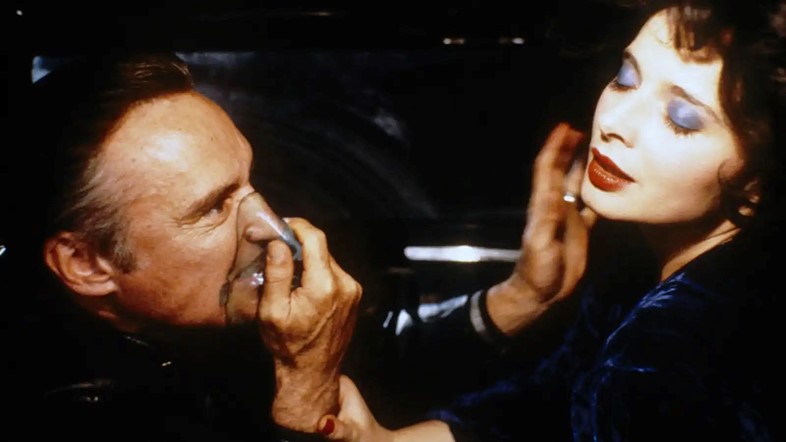
AD: What’s a good piece of advice you’ve been given as an actor?
IR: I remember asking Bob De Niro if there was a method or a teacher I should go to. And he said, “Go to everybody. Because you find at the end you get a piece from here, a good idea there. And you find what works for you.” It was good advice about everything really, about life – instead of having an opinion before doing [something], just do it. And then you’ll have a more informed opinion on whether it works for you.
AD: What’s a treasured early memory of your father?
IR: Just his tenderness, his affection. I remember once I was waiting for him to finish an interview and somebody asked him, “What kind of father are you?” And he answered, “I’m a Jewish mother.” [laughs] And he was a Jewish mother – always hovering around us, very loving, very attentive.
AD: What about your mum? Did you feel very protective of her for the way she was treated in the press?
IR: Yeah, I mean my father had a hard time professionally, but for my mom of course, falling in love with my dad and becoming pregnant before she could obtain a divorce from her first husband, that was a huge scandal in 1950. And it prevented her from coming back to America, because she wasn’t an American citizen and she wasn’t allowed back to the country. They confiscated all her money, but most of all, they didn’t allow her to see her daughter [Pia, from her first marriage], because they gave custody to the father. And mother was seen as a horrible, horrible person. So my mom didn’t see her daughter, Pia, for eight years, until there was a reconciliation and she came to see her.
AD: I don’t know how many times you’ve been on the cover of Vogue, but it’s a lot.
IR: It’s 39!
AD: Do you have a favourite?
IR: I loved working with Richard Avedon; we did four or five covers [together] and it was always wonderful to work with him. Then there are those you don’t expect, like the cover Italian Vogue gave me in October.
AD: This is the one where you asked for the photos to be unretouched, right?
IR: Well I mean, they agreed, you know? I thought it was very brave of them. The people I work with in fashion, whether it’s Vogue or Lancôme or whatever, see themselves as a service. So they are pleasing the audience. Now the audience may protest, “Oh, you’re not representing women of all ages, you’re not representing women of all races.” But if you put an older woman on a cover that issue sells less. So that’s what they struggle with.
AD: Do you feel, though, that this would have been a very different conversation 10 years ago?
IR: I think so, yes. Definitely they’re more experimental now, more daring.
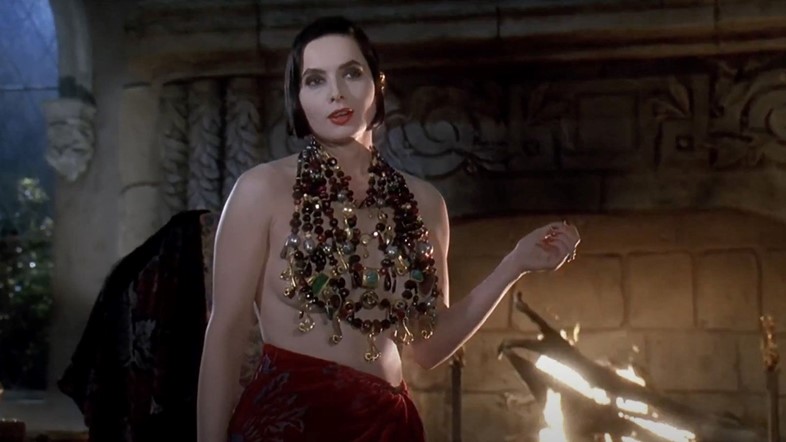
AD: Is there a line from a film you wish you’d been able to speak?
IR: Not really, but “Screw the natural law!” is the one I get most, from Death Becomes Her. A lot of people say hello to me like that. That film is very popular among the gay [community]; they’re making a musical of it now. The other day on Instagram I saw a picture of me with the vial [of youthful elixir] and the comment was, “Every gay guy knows what this is.” And they did! In the comments everyone was like, yep.
AD: Your web series Green Porno has had an amazing life online, recently trending on the Criterion Channel. How do you account for its success?
IR: It’s amazing, isn’t it? I mean, they were done with such an experimental, minuscule budget. And now they’ve grown and grown. When I got my master’s a lot of young people at the university didn’t know Blue Velvet or my modelling work, but some of them said, “Did you do Green Porno?” Which filled me with great pleasure and pride.
AD: If you were another animal, what would you be?
IR: I’m not sure I’d want to be a wild animal because these days they’re all losing their habitats. I’m just looking at one of my dogs lying in my bed now – he lives in the country, takes walks and digs holes. Dogs seem to live a beautiful life. I think I’d like to be a dog.
La Chimera is in cinemas now; read our interview with Alice Rohrwacher and Josh O’Connor here
